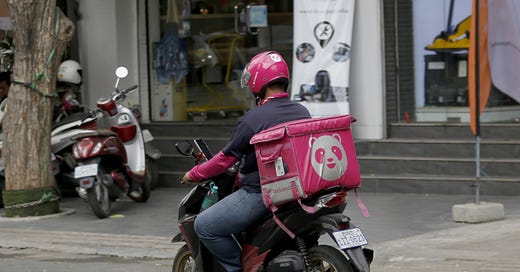Foodpanda Cambodia Restructures Post-Pandemic
foodpanda has undergone a three-month restructure in its Cambodian operations to readjust to post-pandemic times and boost profits sustainably into the future
CHIANG MAI, THAILAND - foodpanda has been through a three-month restructuring process in Cambodia, aimed at steering the company to profitability quicker and rationalizing cost base for a longer-term outlook on the business post-pandemic.
John Francis Arbidans, Regional Director of New Verticals at foodpanda in Cambodia, Laos and Myanmar, said that foodpanda had divested from grocery store pandamart, and is looking for a strategic partner to run a new version of that segment of the business.
“Basically, we divested from having our own brick and mortar dark stores, so there were grocery outlets,” Arbidans told Kiripost in a recent interview in Chiang Mai during a family visit from neighboring Myanmar.
“We decided to divest from that. We took the decision late last year and we had three months to wind that down,” he added.
Tech provider
Arbidans, whose job was to take care of the shops and grocery platforms, said that his position for Phnom Penh has recently been made redundant as part of the restructuring, and the company is now switching its focus more on technology to become a tech provider.
“Instead of being a competitor in the grocery business, we are focusing on tech to become a tech provider, and then partner with more established grocery retailers,” he said.
CHIANG MAI, THAILAND - foodpanda has been through a three-month restructuring process in Cambodia, aimed at steering the company to profitability quicker and rationalizing cost base for a longer-term outlook on the business post-pandemic.
John Francis Arbidans, Regional Director of New Verticals at foodpanda in Cambodia, Laos and Myanmar, said that foodpanda had divested from grocery store pandamart, and is looking for a strategic partner to run a new version of that segment of the business.
“Basically, we divested from having our own brick and mortar dark stores, so there were grocery outlets,” Arbidans told Kiripost in a recent interview in Chiang Mai during a family visit from neighboring Myanmar.
“We decided to divest from that. We took the decision late last year and we had three months to wind that down,” he added.
Tech provider
Arbidans, whose job was to take care of the shops and grocery platforms, said that his position for Phnom Penh has recently been made redundant as part of the restructuring, and the company is now switching its focus more on technology to become a tech provider.

“Instead of being a competitor in the grocery business, we are focusing on tech to become a tech provider, and then partner with more established grocery retailers,” he said.
“We are a tech company so our tech, the level of tech and the solutions it provides is integrated into a lot of other platforms, tech platforms that allow us to deliver a quick commerce model.”
Arbidans said that foodpanda had seen the rationalization coming among smart delivery businesses, which enjoyed immense and rapid growth during Covid. However, as business normalized and things reopened, quick delivery is not as important as before.
“We see that we have to change many aspects of the business because the money from the share market is no longer moving into these types of businesses, then moving out and then into other things that require investments for reopening,” he said.
He added that Covid represented a massive growth for foodpanda, during which time they saw the launch of many new business verticals and business units within the business ecosystem, with many opportunities.
“But now, there is a realization that we need to roll back on costs to make the foundation pillars of the business sustainable,” Arbidans said.
“Expansion plans for now aren’t probably as important as they were before, it’s more about making sure that we get good quality vendors and that we focus on increasing the offering that we can provide to our monthly active users base and we are making sure that we remain competitive in the marketplace.”
Phnom Penh as cost saving measure
Commenting on Cambodia in general, Arbidans said that the country has a lot of potential. Compared to Laos, it is a bigger market.
“I think Cambodia is an environment where outside investors are looking closely, and I think the infrastructure’s quite good, cost base if you compare Phnom Penh to other regional centers like Singapore.”
He added that Phnom Penh in particular can be a good place for companies to relocate their headquarters as a cost saving measure.
“It’s a good town of people as well, compared to Laos. Laos is a smaller country in terms of population, so that’s going to be challenging.
“Myanmar represents certainly other challenges as you know the current situation there but what we have in Myanmar is population.”
In Cambodia, Nham24 is the main competition, Arbidans said, adding one major reason is because it had technology in the market prior to foodpanda arriving.
“I think across the board in the industry quick commerce is no longer as important as it was during Covid, so people aren’t expecting the prompt and quick delivery as they were. Delivery times are not doing as quickly as we did in the past, and are not really our focus anymore.”



